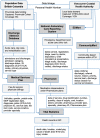Cohort profile: The provincial substance use disorder cohort in British Columbia, Canada
- PMID: 33097934
- PMCID: PMC7825959
- DOI: 10.1093/ije/dyaa150
Cohort profile: The provincial substance use disorder cohort in British Columbia, Canada
Figures





References
-
- Milloy MJ, Montaner J, Wood E.. Barriers to HIV treatment among people who use injection drugs: implications for ‘treatment as prevention’. Curr Opinion HIV AIDS 2012;7:332–38. - PubMed
-
- Hopwood M, Treloar C.. The drugs that dare not speak their name: Injecting and other illicit drug use during treatment for hepatitis C infection. Int J Drug Policy 2007;18:374–80. - PubMed

